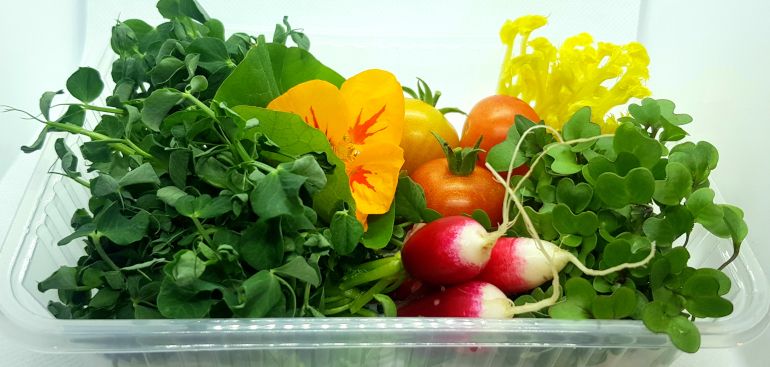How to manage a garden in the 21st century
Transcription by Istvan Bus, edited by Mila Boshnakova, photos by Vladi Tanev
You may have already met Vladi Tanev, as he often sells his products at the Farmer’s Markets. He became a vegetable producer when his previous career ended – he played basketball abroad on a professional level, mainly in Italy. He then resettled in Bulgaria and decided to make a living in agriculture. Of course, the path was not easy, but a sportsman knows what perseverance means.
Let us learn from Vladi, how to start a business from scratch and succeed. He tells us what micro vegetables are, how to cultivate them, and about his unlikely encounter with a hacker who could have taken over his garden.
“Most athletes, we do not know what we will do after retiring from sports. I never planned on becoming a vegetable producer but this is how it played itself out”, says Vladi. He tried several locations around the capital, however, he preferred to stay in Sofia. Since his garden is only 200 square meters, he needs fast-growing crops with high yields which make enough profit to sustain the farm. “I don't grow pumpkins and melons, which have a 120-150 day maturity period – I grow baby carrots and radishes, taking only 30-50 days. Later, I specialized in micro plants where this timespan is around 7-10-15 days.”
But what are micro vegetables?
According to Vladi, “The same vegetables that can be radishes, carrots, and peas, which are normally consumed. But in this case, we are talking about the first two or three leaves of the vegetables. The radishes I sell are a stem and two petals. They taste like radish but they have a much more intensely saturated flavor.”

Since these plants are small, everybody can grow them at home. It is recommended to use a lamp, preferably with 4000 Kelvin light. However, it can be quite challenging to make a living solely off of gardening.
“I visited the top 10 restaurants in Bulgaria and offered them my products – one out of ten was willing to work with me. I started with 10-20 BGN delivery per week; it took a year to build partnerships with a dozen restaurants. Now that I am a bit more well-known, I can choose to some extent with whom I will or will not work. If a restaurant contacts me, I would like to meet the chef to have a chat and build mutual trust in each other. If the magic between two partners eventually occurs, then we have a deal.”
Nonetheless, it is not only restaurants and chefs with whom Vladi built a bond – he also made friends with an IT hacker while gardening.
“I have a cistern at the top of the garden and when the tank is full, the valves open and the water irrigates the soil. There is also a separate sprinkler, sensors that measure the temperature, air conditioning, a dehumidifier, and lamps. These appliances are managed by open-source smart home automation. They send signals through the internet to a server which regulates the data.”
“However, initially they were not encrypted and an ethical Bulgarian hacker found my sensors when scanning for MQTT protocols on the internet. My sensors caught his attention because I named them refrigerator 1, germination, fan 2, and the like. He told me that he could have turned these sensors on and off if he wished. To avoid such nuisances, we encrypted my farm’s online communication and he published the story in his blog.”
Would you like to know who this ethical hacker is and how he detected Vladi’s garden? Stay with us, we are conducting an interview with him as well.
If you would like to hear the full conversation with Vladi, you can find it in Bulgarian in the podcast “Тайни познати.”
